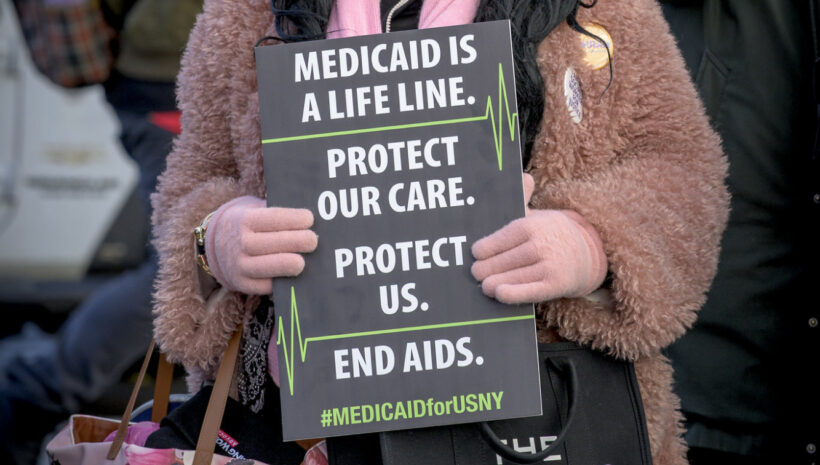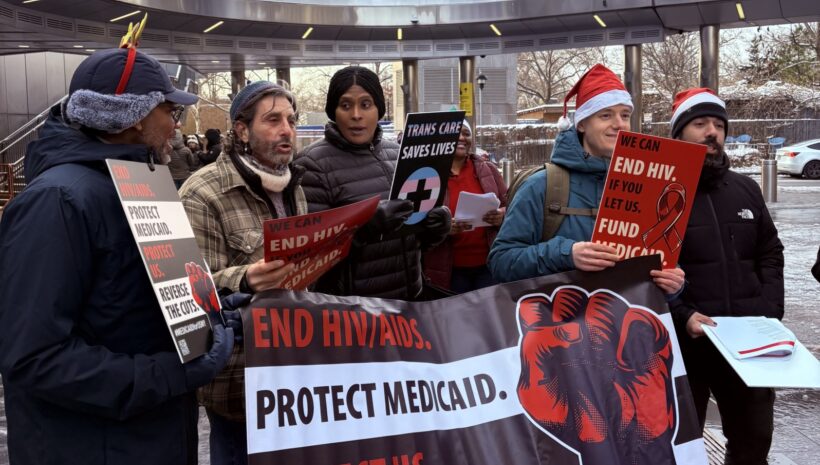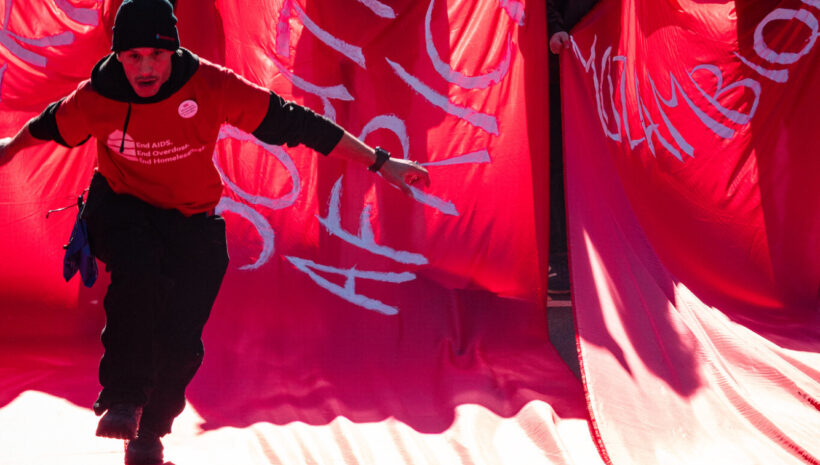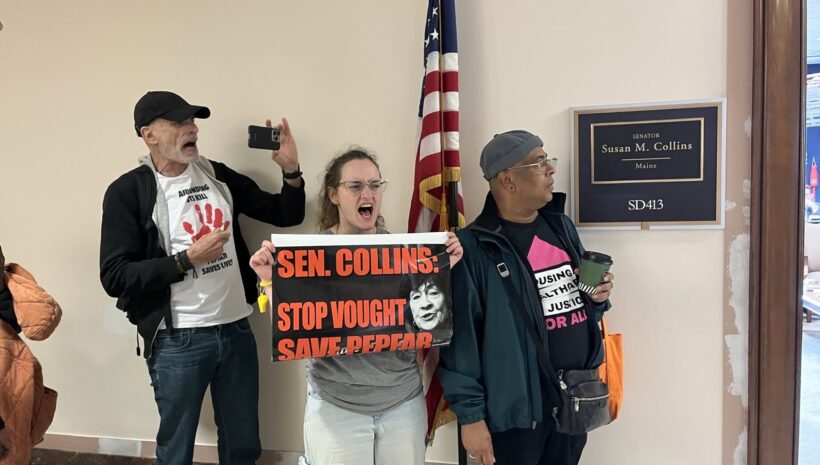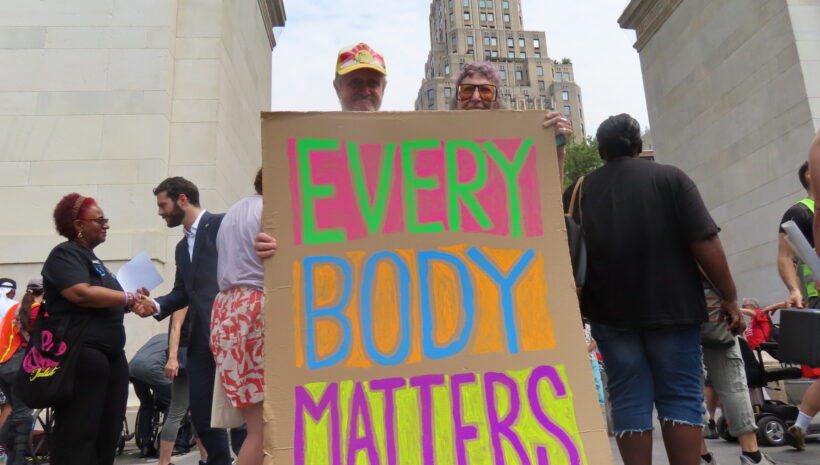Richard Perkins works in the Harm Reduction Department at the Positive Health Project (PHP) as a harm reduction specialist. He provides referrals to services at PHP, harm reduction education, and overdose prevention education. Richard is also involved in advocacy for safe injection facilities and promoting harm reduction as a tool, working closely with community partnerships in the area to create coalitions to exchange services freely. He started at Housing Works three years ago as a peer before applying for a position as an outreach worker and ultimately starting his harm reduction specialist job this year. Concurrent with his work at Housing Works, Richard will be graduating in December with a human services degree and plans to start his Master of Social Work degree next year.
How would you define advocacy, and what does your ideal form of advocacy look like?
Advocacy can be anything as small as making a phone call for a client who's having issues navigating certain systems, anywhere up to civil disobedience. Most of my advocacy, what works most for me, is about 30% direct action and then lots and lots of communications with decision-makers in the communities. I have all of my local reps in state government either on speed dial or at the top of my browser page. I've been building relationships in the community with many state senators and assembly reps, and it's gotten to the point with some of my advocacy where sometimes they do my work for me, which is nice. I have the privilege to talk to these people, so I'm doing it on behalf of people in the community. That's what advocacy means for me. It means, if I could give somebody the tools to advocate on their behalf, that would be ideal, but until that can be done, I am here to support those who might not have a voice.
What is an OPC, and how is it important for harm reduction?
Overdose Prevention Center is the new, softer way of saying Safe Injection Facility, but I think OPC encapsulates its purpose a lot better. We’re not creating it to promote drug use, which is one of the biggest myths. We're building [OPCs] to give people at least a foot in the door to supportive services. Suppose it takes them a year of just coming in to use their drugs safely with medical supervision, with overdose prevention training, with nurses on staff, before they engage in any other kind of service. That's a big step as long as their lives are still protected, and we're preventing overdoses. People are going to use drugs regardless. People are going to be in the street. They're going to be unsafe. They're going to die. If we can prevent those deaths and get them connected to services, we're doing our job. There seems to be a lot of stigma, specifically about safe injection facilities or OPCs promoting drug use, but one thing I like to mention over and over again is that we already have OPCs in this country, and they work.
We tried banning alcohol in the 20s, which drove [alcohol use] underground and made it more dangerous. People died. And what did we do? We created safe supplies called liquor stores. We created safe consumption spots called bars. Despite the efforts of the temperance movement against the devil alcohol, here we are 100 years later, going fine. Sure, alcoholism is a problem, it is deadlier than drug overdoses on an annual basis, yet we haven't banned it. We've created common-sense solutions and created laws and regulations around alcohol consumption, around driving with alcohol. Those laws aren't cynical; they are set up with the understanding that humans will seek out substances, including liquor, to celebrate, to maintain, to survive, or to escape.
OPCs are just as commonsense as creating a State Liquor License Board, as making sure nobody under the age of 21 goes into the bar. I don't believe that any one drug is worse than the other. Stigmatization and criminalization create 90% of the problems when it comes to drug abuse within a community.
How can people practice harm reduction strategies in their own life?
People do it every day! Harm reduction can be anything from wearing a seatbelt to looking both ways before you cross the street. It’s that simple. Not drinking and driving is something that's practiced every day by people -- it's harm reduction. Currently, the safest ways people can promote harm reduction using what the government calls “illicit substances” are by learning about overdose prevention at a Harm Reduction Center, enrolling in a harm reduction program if [a person is] at risk for HIV or Hep C, obtaining fresh syringes, and learning how to inject safely. Without an OPC, it’s like we're giving everybody a car without a license. In an OPC, [drug use] would be in a controlled environment, which would be the ultimate harm reduction because then we would have oversight. That's what's desperately lacking in the “War on Drugs” is oversight to the so-called victims of the War on Drugs. Currently, the way people can [practice harm reduction] is what they would do with any other aspect of life: try to find a way to do what they're going to do in a way that minimizes harm to themselves or others, and all we can do is support them in their efforts.
How does PHP practice harm reduction, and how does harm reduction help members of our community?
The most significant way PHP helps members of harm reduction is education, through either the groups that we have, through our overdose prevention training (including dispensation of life-saving naloxone), peer training, low threshold requirements to get into the program, and safe injection training. [Harm reduction] is just sort of built into our DNA. The way Housing Works promoted harm reduction in my own drug-use journey was by welcoming me back time and again, both when I was a client and even when I was up here [working in the office]. My first year of peer work was fraught with missing weeks because I was having a comedown. I was stuck in this cycle of use. Just being here for me and being willing to work with me until I found my own tools to stop the chaotic nature of my life, using trauma-informed care and motivational interviewing, Housing Works saved my life. I was able to find my way out, and that's what a harm reduction program does. That support is all-encompassing from the top down, and it's extremely valuable to people.
Can you share resources for folks who are interested in learning more?
The Harm Reduction Coalition, Filter Magazine, and this document with Narcan Resources in NYC.
